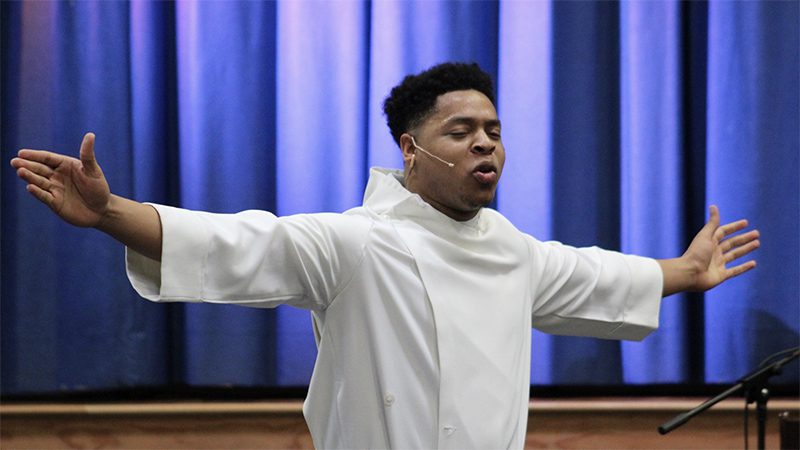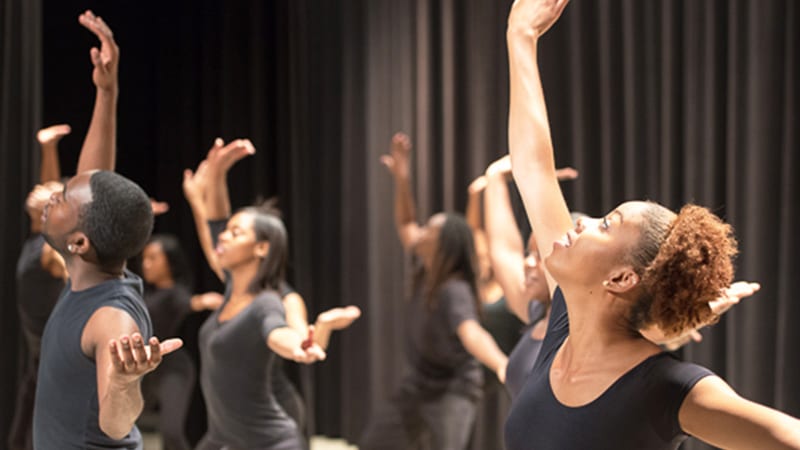The Essential Role of Black Talent in Shaping Drama and Film

Are you a theater geek with a flair for the dramatic? Do you thrive in front of an audience? Are you looking for a major or career that allows you to exercise your passion for creative expression and storytelling?
If so, the performing arts might be for you.
The performing arts is a category that includes music, dance, film, and theater. Many performing arts students choose to specialize in just one discipline; however, it’s possible to study multiple fields and find an aspect of the industry that’s the best fit for you.
Why America Needs More Black Drama Majors
In the worlds of drama and film, representation is never a mere question of numbers; it directly impacts how American society perceives and understands Black history, traditions, and perspectives. Seeking out high-quality entertainment is not only a major element of modern US culture, but an overwhelmingly influential force in shaping it. Americans tend to accept and engage with what we see on stage and on screen, arguably more than we do any other content in any other format.
In essence, there has been, is, and always will be a vital need to fill our narrative landscapes with diverse, authentic stories that reflect the full spectrum of human experience. Our very perception of reality hinges heavily upon this.
Representing Black Experiences and Perspectives
Representation in drama and film holds the power to challenge stereotypes and dismantle prejudices for audiences in approachable ways that allow viewers room for reflection. It’s no wonder, then, that films and TV shows with diverse casts achieve higher box office numbers and foster a greater sense of belonging and understanding among audiences. Creating performative content that mirrors the richness of Black experiences offers cultural mirrors and windows for all Americans.
Shaping Self-Perception and Mental Health
The significance of representation also extends to the perceptions and responses of young Black Americans. Seeing oneself reflected in stories of triumph, resilience, and everyday life fosters a sense of identity and belonging. On-screen representation can significantly impact the mental health of teen viewers of color by validating their experiences and inspiring them with characters who overcome obstacles and achieve greatness.
Owning Cultural and Historical Narratives
Moreover, the inclusion of Black voices in drama and film is crucial for a more accurate and authentic portrayal of history and culture. Films and plays that delve into Black historical and contemporary realities offer valuable insights for everyone and greater narrative ownership for people of color, contributing to a more complete understanding of American history. This is especially the case with regard to narratives that are often overlooked or misrepresented, as bringing these to light can challenge dominant narratives and inspire social change.
Helping Black Theater Thrive in Its Own Right
In recent years, there have been many questions about the true purpose of drama that includes or is centered on Black communities and their experiences. Some professionals in the industry use the terms “African American theater” and “Black theater” interchangeably. Others argue that African American theater is engineered primarily for the perspectives of general, non-Black audiences, while Black theater should be by, about, and for Black communities, taking different truths to be self-evident.
Regardless of any type of theater or performance you’re most interested in, pursuing a major in the performing arts gives you the opportunity not just to be represented in drama or film, but to have a say in how and for whom dramatic narratives are designed.

Claflin University
Careers in Drama, Performing Arts, Dance and Photography
There’s a common misconception that becoming an actor, musician, or dancer is the only possibility for performing arts graduates. While a performing arts degree will certainly set you up for success in those areas, becoming a professional performer is by no means the only option available to performing arts graduates. As a performing arts major, you’ll learn storytelling and communication techniques, aesthetics and design, creative thinking and collaboration skills, and more.
These, combined with the general education requirements that most colleges have, will make you a valuable candidate in a variety of fields. Below are a few of the careers you might consider as a performing arts major:
- Actor/actress
- Musician
- Dancer
- Comedian
- Composer
- Choreographer
- Graphic designer
- Set designer
- Technical director or theater technician
- Teacher
- Screenwriter
- Dance or movement therapist
- Theater
- Studio or theater manager
- Producer
- Propmaster
- Casting director
Whichever aspect(s) of the performing arts you choose to study, you’ll enjoy a uniquely hands-on education in which you’ll learn the finer points of creative expression, artistic history and theory, and performance production. You’ll also gain valuable translatable skills that will help you carve out a career in a variety of industries.
Depending on which performing arts discipline you choose to major in, your coursework will likely include subjects such as:
- Acting
- Technical theater
- Stage management
- Theater history
- Choreography
- Dance technique
- Voice and/or instrument lessons
HBCUs Can Help You Start a Career in a Performing Arts Discipline
Given the recent Supreme Court ruling on affirmative action in college admissions, more Black students are likely to turn to historically Black colleges and universities (HBCUs) for their education. In response, these institutions will do everything they can to meet increased student demand. HBCUs help more students earn college degrees, compete successfully for well-paying jobs in competitive career fields, improve workforce diversity, and increase upward economic mobility.
People of all ages, races, and life paths can help to improve diversity in performing arts disciplines by supporting scholarships and other forms of funding for HBCUs with related programs. You can make a difference in the lives of performing arts students in one easy step by making a donation today.
Want to learn more about performing arts as a possible major or career path? Have questions about which UNCF colleges and universities offer this program? Looking for help with financing this degree?
Click Here So We Can Help You!
How to Prepare for Success
Students interested in the performing arts should do as much as they can to explore and hone their creative talents leading up to high school. Taking courses in drama or theater, dance lessons, and voice or music lessons can help to build your foundation in your chosen discipline. In addition, participating in school or community theater productions, dance recitals, and bands or choirs will help build your performance and collaboration skills.
UNCF Schools to Consider
Multiple UNCF-member schools offer degrees in the performing arts, including:
- Spelman College
- Johnson C. Smith University
- Xavier University of Louisiana
- Virginia Union University
- Morehouse College
- Oakwood University
- Benedict College
- Wilberforce University
- Dillard University

Professional Organizations
If you’re thinking about majoring in performing arts, it may be helpful to familiarize yourself with some of the programs, membership options, and resources offered by professional organizations. Exploring these will also give you a good idea of the scope and career opportunities the field has to offer.
- American Theater And Drama Society
- National Dance Education Association
- National Dance Council of America
- Association of Performing Arts Professionals
- National Dance Society
Scholarships Available
There’s no better way to start on your path toward a successful career in performing arts than with a solid financial foundation. Fortunately, many scholarships are available through UNCF, including some specifically for performing arts majors. Keep an eye on the UNCF website for current scholarship opportunities and announcements.
Search for specific scholarships and view those that are currently accepting applications here! Students should also check with each college or university to see if there are additional scholarships available to study performing arts.
As you explore your options, be sure to use our guide to applying for scholarships and grants. You can also receive guidance by submitting a major interest form if you are interested in a career in performing arts. Submit the form on our website to get started, and follow us on UNCF social media channels to receive notifications about our scholarships and member HBCUs. Reach out today!
You can also show your support for students pursuing careers and furthering equity in the arts by contributing to UNCF member schools. Education is the greatest tool we have in creating a just and equitable society where truth reigns and economic mobility is available to all. Help us achieve this future by donating today!